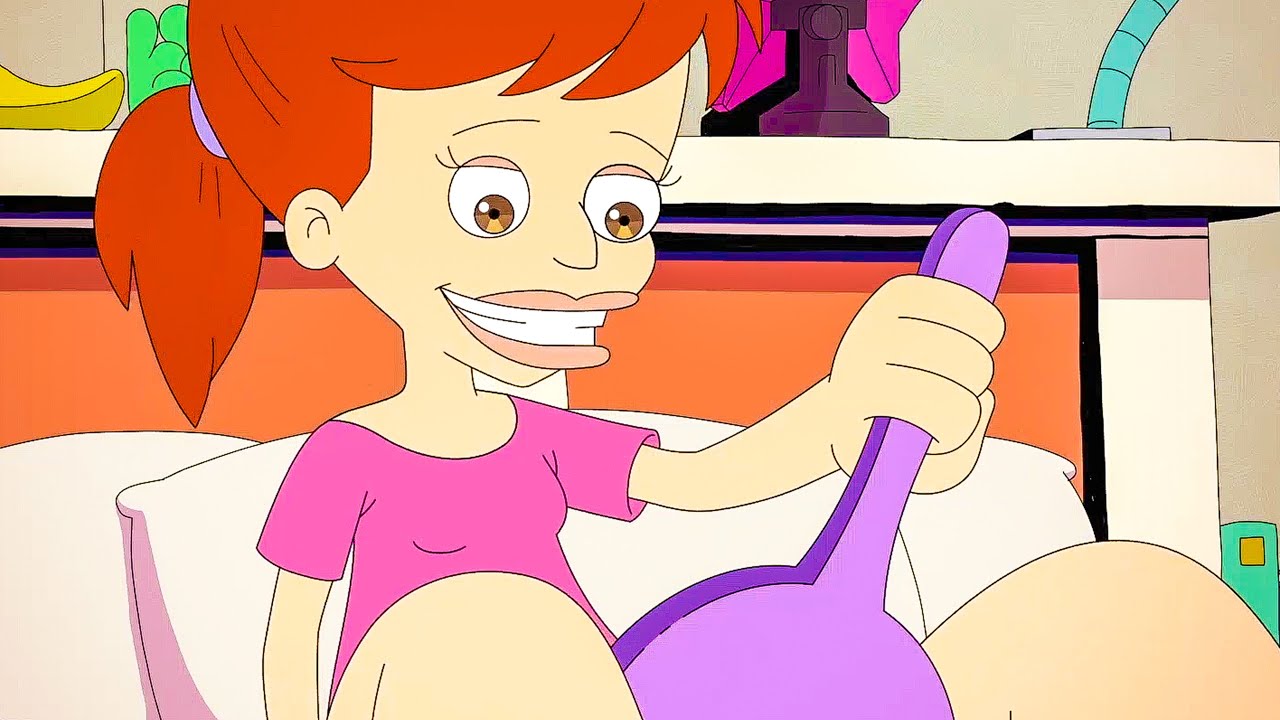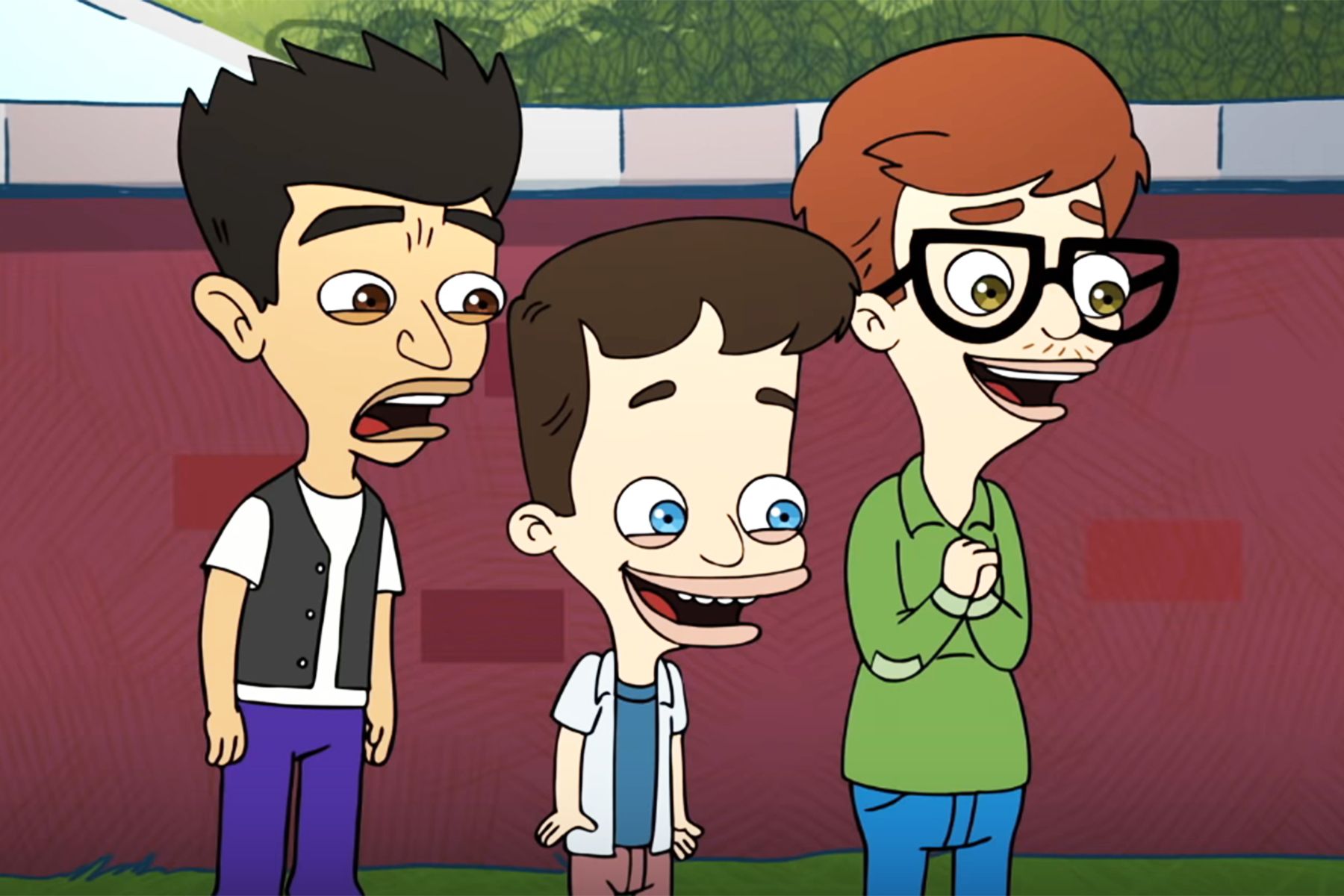Puberty isn’t easy. This is an understatement, but still something worth remembering; the physical and emotional changes that you go through can be terrifying to deal with; it’s no wonder that the mutants in X-Men tend to develop their mutations during puberty, and adolescence becomes literal body horror in films like Ginger Snaps. But Big Mouth, an animated comedy about the agony and ecstasy of adolescence created by Nick Kroll, uses Hormone Monsters, talking pubes, and the ghost of Duke Ellington as a way to bring puberty to life.
On the surface, Big Mouth begins and ends with its crassness, something that culminates in the season one finale, when Nick (voiced by Nick Kroll) and the Hormone Monster (also Nick Kroll) travel to the alternate dimension of the Pornscape in order to search for fellow student Andrew (John Mulaney). This alternate world is exactly what it sounds like, a place that’s entirely inhabited by Andrew’s deviant search history. But Big Mouth doesn’t just coast on blue humour; it challenges the Pornscape — something Andrew falls into after becoming increasingly desensitised to porn — by drawing a line between healthy and unhealthy explorations of sexuality. The Pornscape is a Bosch-like hell of warped desire; the Hormone Monster even goes so far as to say that if Andrew isn’t rescued from the Pornscape, he won’t be able to form lasting physical or emotional connections with other people. When he’s just about to leave, Andrew is given a choice by the dildo-footed object of his desire: leave and return to reality, or stay with her in the Pornscape. Big Mouth forces its characters to deal with not just their changing bodies, but their emotions; by putting Andrew in a face-to-face confrontation with a pornographic fantasy, the show illustrates what a person needs to do in order to be healthy in both body and mind. This is the bizarre beauty of Big Mouth; it uses dick jokes as a way to talk sincerely about genuinely difficult issues faced in real life.
The ways in which characters talk to the strange and surreal things that surround them as they go through puberty is a way for the characters to talk to, and understand, parts of themselves. In one of the show’s flourishes of self-awareness — in an episode titled Girls Are Horny Too, we’re told that “Jessi discovers her vagina, its very sex-positive.” And that’s exactly what happens; Jessi (Jessi Klein) has a conversation with her Kristen Wiig voiced vagina. For all of the visual strangeness of this sequence, and similar ones (Nick talks to his two pubes in a season two episode), the message and earnestness of it are crystal clear: exploring your sexuality is healthy and normal.
But not everything in Big Mouth is about healthy development and exploration. Socially and psychologically as much as biologically, puberty can be a bitch, and the show refuses to offer easy answers to the difficult questions that adolescents ask themselves and each other. Season two introduces the Shame Wizard (or Shane Lizard, depending on who he’s talking to). The mission of this evil magician is right there in his name: he makes the characters feel ashamed of what they’ve done, first appearing when Andrew is caught masturbating to thoughts of Nick’s sister — followed by Andrew’s appearance at the court of shame, where a room full of Andrews tell him to be, you guessed it, ashamed. His presence looms large throughout the second season, and he even gets a musical number during a particularly fraught class sleepover. Big Mouth never endorses a shameless bacchanal, but it believes sincerely that exploring yourself and your desires is nothing to be ashamed of, as long as they’re explored in a healthy way. The fact that the characters try to physically and verbally articulate their desires to others and themselves is played dead straight: Jessi talking to her vagina allows for literal self-exploration, just like Nick’s conversation with his pubes allows him to try and find an answer to the question “Am I normal?”
The difficult social territory of adolescence is also examined through everything from double dates to the morality of a “hump and dump” (you don’t need me to define this one for you). The show gets how teens actually communicate; the idea that the character Gina is a “slut” spreads like wildfire over an endless cycle of text messages. Being young is hard, and the show approaches this with nuance. The onset of Jessi’s depression is treated with visual inventiveness and emotional sensitivity in the form of the Depression Kitty, a large, sweet-voiced feline who tries to take care of Jessi. For all of the absurdity of Jessi talking to a giant cat, and being almost literally smothered in a padded room, this analogy for the often oppressive nature of mental illness works. Jessi is literally losing herself as she becomes physically and emotionally overwhelmed by depression.

The show is, of course, imperfect. It has a narrow, pretty heteronormative focus. The season one episode Am I Gay? ends without offering a satisfactory answer to its title question; and in having the Ghost of Freddie Mercury sing “you’re gay/totally gay,” continues the seemingly endless erasure of bisexuality. The second season does a little better on this; in what feels like another one of Big Mouth’s moments of self-awareness, it seems to criticise itself for underwriting the one gay character when he’s told that “being young, gay, and mean is not a personality”. The final episodes of season two look like another interesting step forward, explicitly referencing the loneliness of being the “one queer kid, trying to fit in”.
Big Mouth is gross, weird, funny, and moving. It dresses up didacticism through a strange and wonderful visual palette — bi erasure is shown through cushions and pillows warring for affection, and depression is brought to life as a giant cat — but still manages to communicate these issues as deeply important. Perhaps most importantly, Big Mouth never loses faith in either its audience or characters. These talking objects and strange creatures exist to do more than just generate laughs; they allow for the characters to see (sometimes literally) themselves. Broad humour, like exploding heads, is used as a vehicle to explore female sexuality, and an evil wizard shows people just how hard it is to grow up. By striking this balance between crassness and sincerity, Big Mouth, to put it simply, understands.

